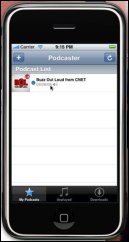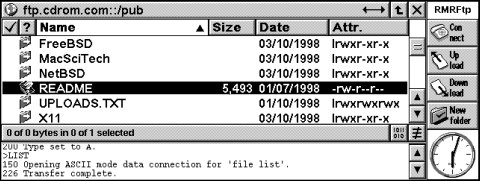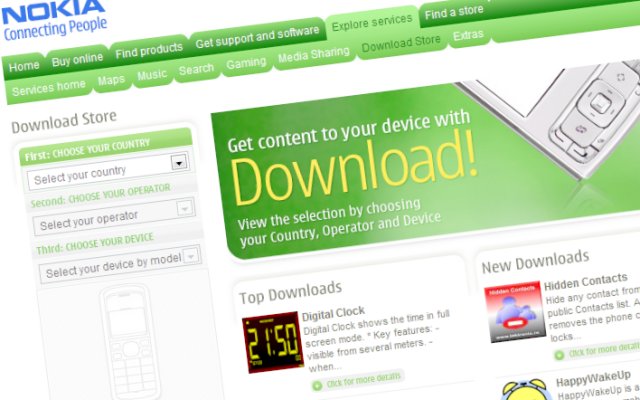 In case you missed it, last week saw a number of developers commenting on Apple's handling of a submission to the Apple iPhone Store - specifically the fact that Apple would not let an application into their store. This isn't the first time that an app has been blackballed... the irreverent 'Pull My Finger' that let out a rather rude sound on stroking a virtual finger, and the more useful 'NetShare' that let your iPhone act as a modem for your PC or Mac being two notable banned apps for reasons of 'limited utility' of the former and probably encroaching on legal issues between Apple and AT&T on the latter.
In case you missed it, last week saw a number of developers commenting on Apple's handling of a submission to the Apple iPhone Store - specifically the fact that Apple would not let an application into their store. This isn't the first time that an app has been blackballed... the irreverent 'Pull My Finger' that let out a rather rude sound on stroking a virtual finger, and the more useful 'NetShare' that let your iPhone act as a modem for your PC or Mac being two notable banned apps for reasons of 'limited utility' of the former and probably encroaching on legal issues between Apple and AT&T on the latter.
But the banning of 'Podcaster' is much more worrying - Apple refused to carry it in the store. Why? "Since Podcaster assists in the distribution of podcasts, it duplicates the functionality of the Podcast section of iTunes."
On any other platform this wouldn't be an insurmountable problem, the author would just submit the application to another online store, or even look at hosting the installation file on their own web site, perhaps using Paypal to process the transaction. Unfortunately for Apple developers, the iTunes store is by definition the only game in town.
In the long term, an open ecosystem is much better for a platform, and the ability for people to decide what to put on their devices should be paramount. Some of these banned applications may be silly, but I did love the quote though on one blog that said "I can think of many good uses for a TCP/IP whoope cushion."
And of course, having developers taking up the mantle of providing better code or applications than those built in is a good thing. I'm reminded back in the days of Psion [cue Steve...] that the application BusyView augmented the built in Agenda by providing a graphical view of when you were busy. Later versions of the Series 3 had this facility built in. Or RMR's FTP software that was initially shareware, but eventually bundled in the ROM of the Psion Netbook. Coming right up to date, the main alternative to Nokia's regular email client was provided by Lonely Cat Games (although Nokia have a beta of a new client currently available).

The open nature of programming and distribution positively encourages developers to take on any challenge. The idea of a rising tide lifting everyone is generally acknowledged, and definitely applies to the smartphone market. When you have the handset manufacturer saying you can't do anything related to the apps we already do (or are planning to do in the future that we've not told you about), how can that be reassuring for developers?
Of course Symbian has many issues that make developers think twice, such as the past fragmentation of the platform and the obscure nature of Symbian C++, but these have been addressed through the Symbian Foundation and the new languages Nokia are bringing to S60, but at least developers (and those funding them) won't suddenly have Nokia cutting off their route to market.
The argument that this is there to prevent the user experience from becoming poor is valid to a certain extent (I'm wondering just how many different Clock applications the iPhone actually needs), but there is a way for developers to to address this. If someone, such as a network operator, needs the reassurance that an application will be 'safe', then this is what Symbian Signed was designed for. Symbian OS has this certification and trust when required, but it is balanced by the open nature of "anyone can code, and anyone can distribute".
Having a solitary point of contact for discovering new applications may be great when there are 100 applications, or 1000, and it does make it somewhat easier for a new platform with people just discovering the ability to install third party apps. But as you approach 10,000 it's going to get very hard to be fair when promoting new applications, bestsellers, large publishing houses bundling 20 titles at a time, and still continue to be perceived as being a fair and level marketplace. And there's no easy route for people who have quirky or fun applications that a censor thinks is 'trivial.' One man's trivia might be another's Zen Garden.

Apple have decided on a single point of distribution (and curiously giving them almost 100% control of what appears on individual phones that people have paid a significant amount to own). Symbian have gone for a more open approach on the internet, while continuing to provide carriers with the tools to have 'trusted' applications available through their on-deck portals.
I know which model I prefer, and I know which model provides the greatest stability in the ecosystem for developers and investors. And it's the one that sits behind the largest mobile OS system on the planet.
-- Ewan Spence, September 2008
